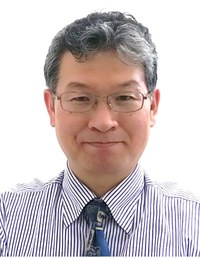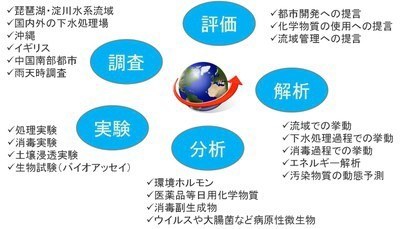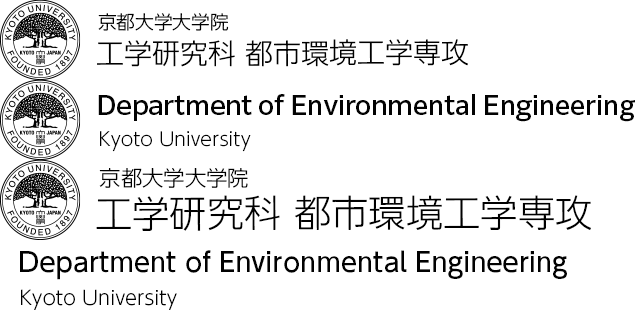Environmental Quality Prediction
We have conducted research on the behavior of pollutants in the environment and their effects on human health and the water-resident ecosystem, as well as on the development of countermeasure technologies. Based on field surveys and experiments, we conduct researches on understanding the actual presence of environmental pollutants and their management technology using instrumental analysis and biophysical evaluation, the construction of a sound urban water circulation system, and water treatment technology that contributes to a recycling-oriented society.
Academic Staff
Fumitake NISHIMURA
Professor (Graduate School of Engineering)
Research Topics
In order for sound social activities to be carried out, it is necessary to ensure healthy and cultural lifestyles for people. To achieve this, it is necessary to develop the infrastructure (e.g., sewarage) to support such activities and to promote "sound material circulation" through appropriate operation. We are conducting the following research to contribute to this sound material circulation.
- Research on environmental monitoring (understanding the dynamics of drug-resistant microorganisms, viruses, and toxic substances)
- Water environment management in watersheds for water conservation and water utilization (nutrient management, control of harmful substances and microorganisms (ozone, accelerated oxidation treatment))
- Development of resource recovery and energy-saving wastewater treatment technology (energy recovery and resource reuse)
- Research on the utilization of "information" contained in wastewater and data on the operation and management of wastewater treatment facilities (Wastewater-Based epidemiology, application of AI)
Contacts
Research Center for Environmental Quality Management, Kyoto University,
1-2, Yumihama, Otsu, Shiga 520-0811 Japan
Phone: +81-77-527-6225, fax: +81-77-524-9869
E-mail: nishimura.fumitake.3n![]() kyoto-u.ac.jp
kyoto-u.ac.jp
https://researchmap.jp/Fumitake_Nishimura/research_areas?lang=en
Research Topics
Water quality and risk assessment for the conservation of a sound water ecosystem
There is concern that pathogenic microorganisms and chemicals closely related to daily life may affect human health and the health of the water ecosystem. For example, residual pharmaceuticals, endocrine disrupting chemicals and other biologically active substances in treated water have been shown to affect the growth of algae and feminize fish in water. In addition, viruses and antibiotic-resistant microorganisms and genes that are not sufficiently removed by sewage treatment plants can spread into the aquatic environment, posing a risk of infection through water use. This research aims to manage water quality and risk to maintain a sound water ecosystem, and we are addressing this issue based on field studies in rivers and sewage treatment plants, using chemical analysis such as LC-MS/MS (liquid chromatography-tandem mass spectrometry), measurement of pathogenic microorganisms such as viruses, and development and spread of antibiotic-resistant microorganisms. We are tackling this issue based on field surveys at rivers and sewage treatment plants.

Fig1. Research contents conducted in our laboratory
Behavior of emerging pollutants and pathogenic microorganisms in water circulation systems and development of their reduction technologies
In the Lake Biwa-Yodo River basin, surface water is repeatedly used not only as environmental water, but also for water supply and agriculture and so on. In order to maintain its worth as a water resource, it is necessary to assess the risk of water quality as well as water quantity, and to implement appropriate control measures. In this study, we investigate the behavior, evaluation, and control of biologically active micropollutants and pathogenic microorganisms in the water cycle system with a view to watershed management. For this purpose, we have conducted monitoring in watersheds (water environment) and sewage treatment plants, and have conducted research and development of technologies to reduce the residual of micropollutants in sewage by applying biological process, oxidation process such as ozonation, and membrane treatment.

Fig2. Continuous wastewater treatment system (physicochemical treatment)
Achievement of a safe and secure water circulation system that supports a sound society and human health
Sewage produced every day is a valuable resource not only because of its stable volume, but also because of the valuable chemicals and heat contained in it. In this study, we are researching the reuse technology using membrane treatment, oxidation treatment, etc. for the reuse of sewage and treated water in urban and agricultural areas. In this research, we are not only interested in the volume of water, but also in the presence and removal of biologically active substances, carcinogenic disinfection by-products, and pathogenic microorganisms, as well as in the energy that is reduced or generated. This research is also supported by the Japan Science and Technology Agency's Program(JST-Mirai Program). We aim to realize safe and secure water use by identifying the sources of health risks (critical control points) such as viruses, pathogenic bacteria, drug-resistant bacteria, and chemical substances, and by introducing water treatment technology based on risk assessment and risk control. https://www.jst.go.jp/mirai/jp/uploads/saitaku2022/JPMJMI22D1_summary.pdf

Fig3. A society with access to safe and reliable water resources (JST-Mirai Program)
